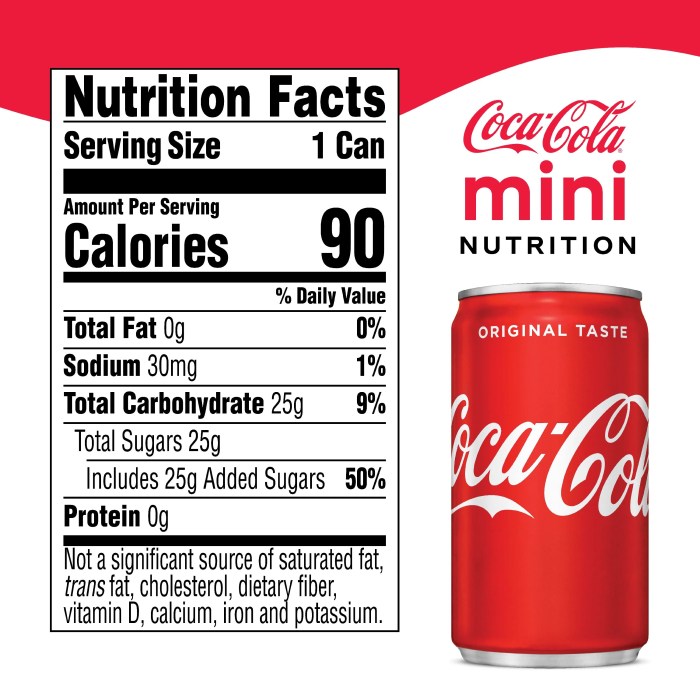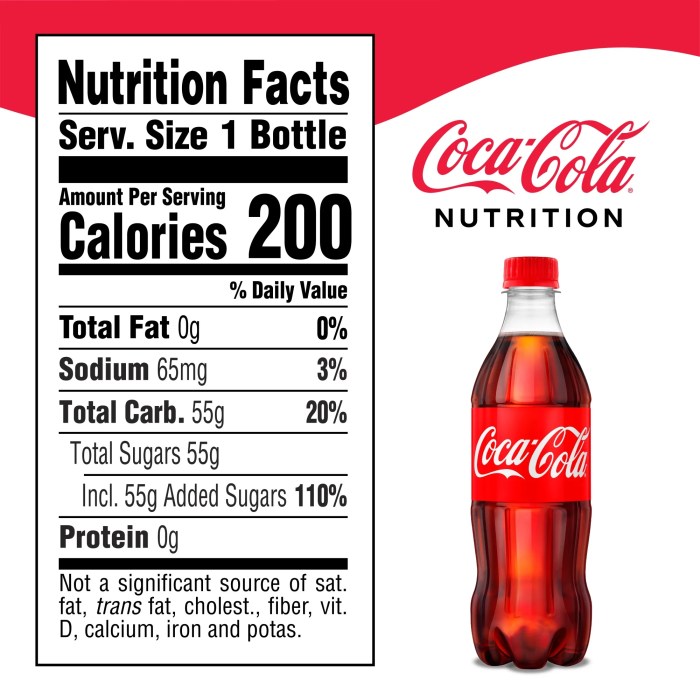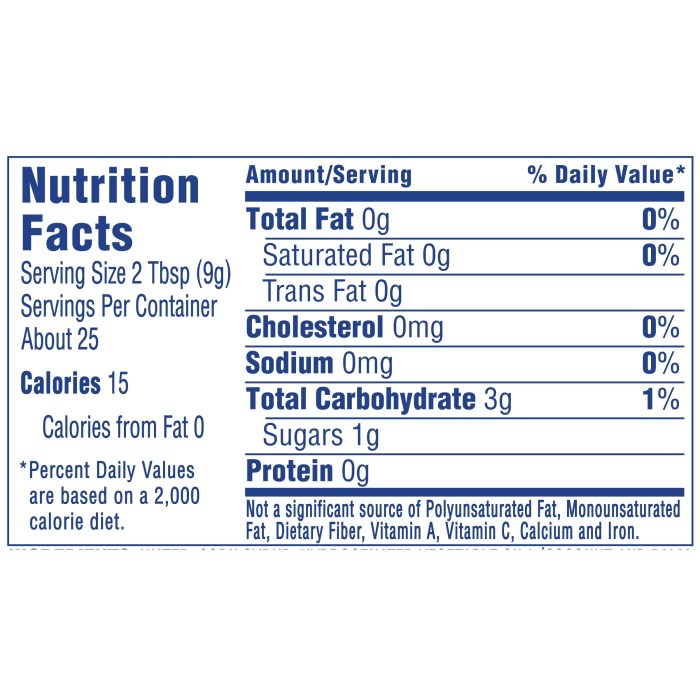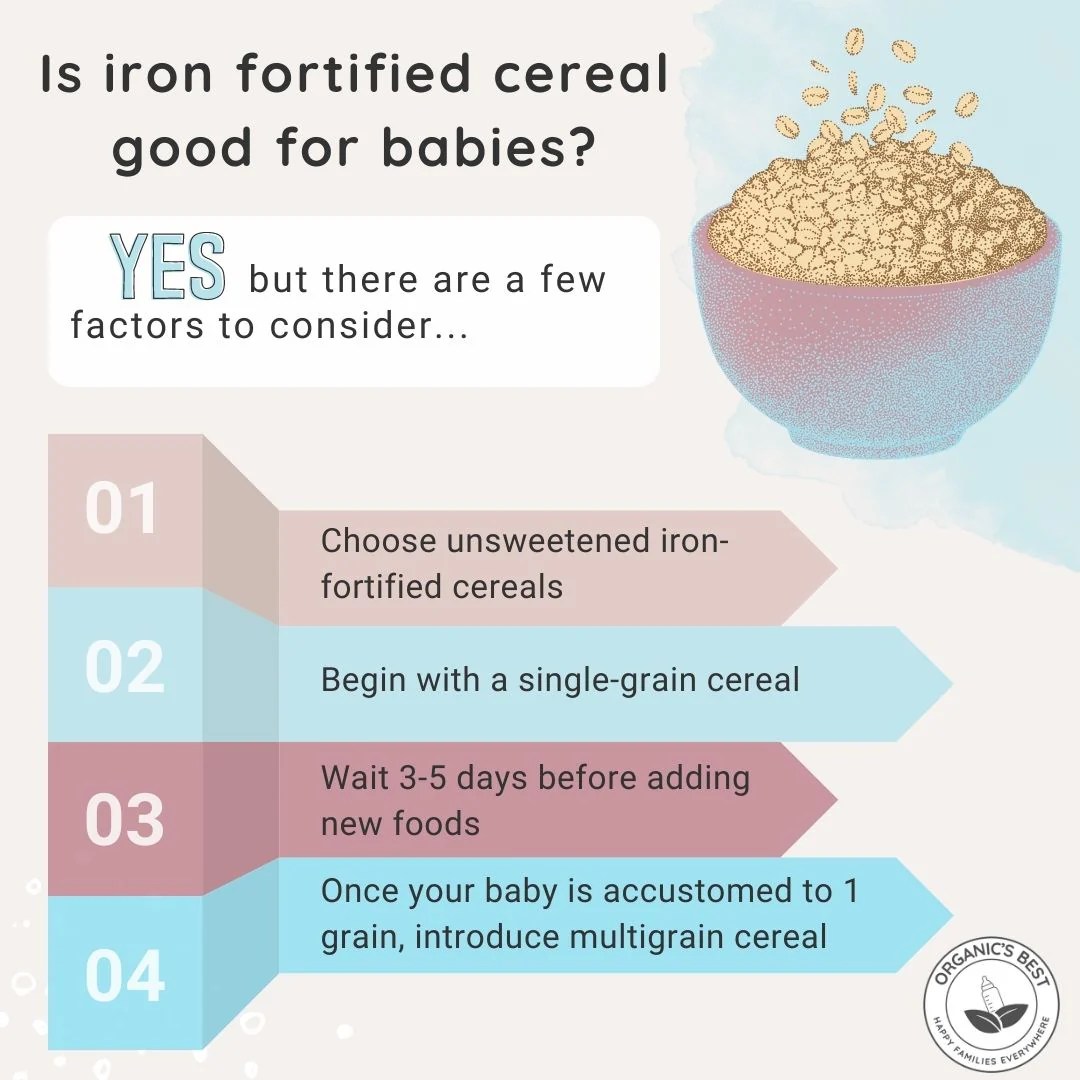Ingredients and their Effects

Nutrition facts on a can of coke – Coca-Cola’s ingredient list varies slightly depending on location and specific product variations, but a typical can contains a blend of components that contribute to its characteristic taste and properties. Understanding these ingredients and their potential effects on health is crucial for making informed consumption choices.
The primary ingredients are carbonated water, high fructose corn syrup (or sugar in some regions), caramel color, phosphoric acid, caffeine, natural flavors, and other additives like preservatives and flavor enhancers. Carbonated water provides the fizz. High fructose corn syrup or sugar contributes the sweetness. Caramel color imparts the iconic brown hue. Phosphoric acid adds tartness and acts as a preservative.
Caffeine provides a stimulant effect. Natural flavors contribute to the complex taste profile. The precise composition of these “natural flavors” is often proprietary information.
High Fructose Corn Syrup’s Health Impact
High fructose corn syrup (HFCS) is a significant source of added sugar in Coca-Cola. Its consumption has been linked to various health concerns. HFCS is metabolized differently than sucrose (table sugar), potentially leading to increased fat storage in the liver and contributing to insulin resistance, a precursor to type 2 diabetes. Studies have also associated high HFCS intake with an increased risk of non-alcoholic fatty liver disease and weight gain.
For example, numerous epidemiological studies have shown a strong correlation between high sugar-sweetened beverage consumption, including those containing HFCS, and the prevalence of obesity and metabolic syndrome. The body processes fructose differently than glucose, potentially leading to more significant health consequences.
We’re all familiar with the sugar content shock of a can of Coke; the nutrition facts clearly highlight its high sugar and calorie count. It’s interesting to contrast this with something unexpected, like considering what are the nutrition facts of roses what are the nutrition facts of roses , which is quite different, of course. Returning to the Coke, understanding these nutritional details helps us make informed choices about our consumption.
Artificial Sweeteners and Their Long-Term Effects
While some diet Coke variations utilize artificial sweeteners like aspartame or sucralose to reduce sugar content, concerns remain regarding their long-term health effects. While generally considered safe in moderation by regulatory bodies, some studies have suggested potential links between artificial sweeteners and various health issues, including altered gut microbiota, increased appetite, and even potential impacts on glucose metabolism, although the evidence is not conclusive and further research is needed.
Long-term studies with larger sample sizes are needed to definitively assess their potential long-term consequences.
Potential Health Risks Associated with Regular Coke Consumption, Nutrition facts on a can of coke
The following list summarizes potential health risks linked to the regular consumption of Coca-Cola, primarily due to its high sugar and caloric content, and the presence of phosphoric acid and caffeine:
- Weight gain and obesity
- Increased risk of type 2 diabetes
- Increased risk of cardiovascular disease
- Tooth decay and dental erosion due to acidity
- Dehydration due to its diuretic effect
- Increased risk of non-alcoholic fatty liver disease
- Potential for caffeine-related side effects such as anxiety and insomnia
Comparison with Other Beverages

Choosing a beverage often involves a trade-off between taste and health. Understanding the nutritional profiles of different drinks helps make informed decisions about what we consume. This section compares Coca-Cola to other popular beverage options, highlighting key differences in sugar, calorie, and overall nutritional content.
Nutritional Comparison of Beverages
The following table provides a comparative overview of the nutritional content of a 12-ounce serving of Coca-Cola, orange juice, water, and diet cola. Note that values can vary slightly depending on the specific brand and preparation.
| Beverage | Calories | Sugar (grams) | Other Nutritional Aspects |
|---|---|---|---|
| Coca-Cola | 140 | 39 | High in added sugar, carbonated, contains phosphoric acid. |
| Orange Juice (100% juice) | 110-120 | 21-26 | Source of Vitamin C, natural sugars, some fiber. |
| Water | 0 | 0 | Essential for hydration, zero calories, zero sugar. |
| Diet Cola | 0-5 | 0-1 | Artificial sweeteners, often contains phosphoric acid, may lack essential nutrients. |
Health Implications of Choosing Coca-Cola
Regular consumption of Coca-Cola, compared to healthier alternatives, is associated with several potential health risks. The high sugar content contributes to weight gain, increased risk of type 2 diabetes, and dental problems. The phosphoric acid can contribute to bone loss over time, particularly with excessive intake. While an occasional Coke might not have significant detrimental effects, frequent consumption can negatively impact overall health.
In contrast, water is essential for bodily functions and has zero calories. 100% fruit juice offers some vitamins and minerals, but its natural sugar content should be considered. Diet sodas, while calorie-free, contain artificial sweeteners which have been linked to potential long-term health effects in some studies, although the research is ongoing and inconclusive. The choice of beverage significantly influences daily nutritional intake and long-term health outcomes.
Impact on Overall Diet: Nutrition Facts On A Can Of Coke

Coca-Cola, like other sugary drinks, presents a challenge to maintaining a balanced diet. Its high sugar content contributes significantly to daily caloric intake without providing essential nutrients, potentially displacing the consumption of nutrient-rich foods. Understanding its impact is crucial for making informed dietary choices.Regular consumption of Coca-Cola can negatively impact overall nutritional intake. The high sugar content contributes to excess calorie consumption, potentially leading to weight gain and related health problems such as type 2 diabetes and cardiovascular disease.
Furthermore, the absence of essential vitamins, minerals, and fiber means that Coke offers no nutritional value, thus displacing the opportunity to consume foods rich in these vital components. This can lead to nutritional deficiencies if Coke consumption significantly replaces meals or healthier beverage choices.
Nutritional Deficiencies from High Sugar Drink Consumption
A diet high in sugary drinks like Coke can lead to several nutritional deficiencies. The high sugar content often displaces the consumption of fruits, vegetables, and whole grains, which are rich sources of vitamins, minerals, and fiber. Specifically, deficiencies in vitamin C, vitamin A, potassium, and fiber are common among individuals who consume large quantities of sugary beverages.
These deficiencies can weaken the immune system, increase the risk of chronic diseases, and negatively impact overall health and well-being. For example, a person consistently choosing Coke over orange juice will likely miss out on crucial vitamin C, which is vital for immune function and collagen production.
Strategies for Reducing Coke Consumption
Reducing Coke consumption involves a gradual transition towards healthier alternatives. One effective strategy is to gradually decrease the amount of Coke consumed daily, substituting it with water, unsweetened tea, or other low-calorie beverages. Another approach involves setting specific goals, such as reducing Coke consumption by one can per week. This allows for a more manageable transition and helps prevent feelings of deprivation.
Furthermore, exploring healthier alternatives, like sparkling water with a squeeze of lemon or lime, can provide a similar fizzy sensation without the added sugar. Mindful consumption, paying attention to thirst cues and avoiding mindless drinking, is also crucial for managing intake. Finally, substituting Coke with healthier options during meals and snacks is another effective strategy.
FAQ Resource
What are the long-term effects of drinking Coke regularly?
Regular consumption of Coke can contribute to weight gain, type 2 diabetes, tooth decay, and other health problems due to its high sugar and calorie content.
Is diet Coke a healthier alternative?
Diet Coke is lower in calories and sugar, but it contains artificial sweeteners, whose long-term health effects are still under investigation. It’s not necessarily a “healthier” choice, but it may be a less harmful option in moderation.
Can I still drink Coke if I’m trying to lose weight?
Consuming Coke while trying to lose weight is generally discouraged due to its high calorie content. It’s best to limit or eliminate its consumption to support weight loss goals.
Are there any vitamins or minerals in Coke?
Coke contains minimal to no vitamins or minerals; it’s primarily sugar, water, and artificial flavorings and colorings.






